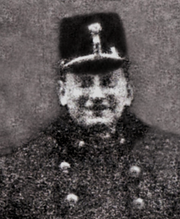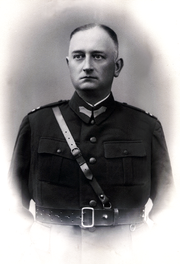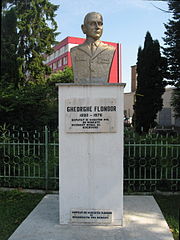George of Flondor
Georg Ritter von Flondor , Romanian : Gheorghe cavaler de Flondor , (born August 31, 1892 in Roman , † April 26, 1976 in Bucharest ) was a Romanian politician and the last royal governor of Bukovina .
biography
The offspring of the old Romanian boyar and Austrian aristocratic family Flondor studied law at the University of Vienna and Prague at the State High School No. 3 in Chernivtsi . After completing his studies, Georg served in the Dragoon Regiment No. 14 in various theaters of war, including Serbia and Italy, during the First World War . In 1917 he was badly wounded on the Romanian front, was sent to the Baden military hospital and was then sent to Italy again with the rank of captain, then retired in the spring of 1918 to ensure the administration of his property.
He has received several awards for his military service, such as the Silver Medal for Bravery 1st and 2nd Class , the Signum Laudis and the Military Merit Cross 2nd Class (KD.) .
Political activity
Flondor began his political career in 1923 when he joined the National Liberal Party of Romania, precisely on the proposal and with the support of the well-known Romanian historian Ion Nistor , a declared opponent of his uncle Johann von Flondor . He rose quickly in the party hierarchy, was a member of Rădăuți in the Romanian parliament from 1927 to 1935 , and then a senator for two years. During this time he was also President of the Bank of Siret and twice in a row of the Chamber of Agriculture of Rădăuți. As President of the Union of Syndicates for Animal Export, he traveled to Austria , Germany , Egypt and Palestine with the aim of opening up new sales markets.
In 1939 the politician was elected advisor to the Frontul Renașterii Naționale (Front of National Revival). After the impeachment of Gheorghe Alexianu , he was appointed royal resident of the Suceava area with headquarters in Chernivtsi by King Carol II on February 7, 1939 , where he was received with high honors. Besides the mayor of the city Nikolaus von Flondor, the consuls general of Germany , France , Sweden , the Netherlands and Poland paid their respects to him. Flondor saw his main tasks in improving the economic and living conditions of the peasant population on the one hand, and in maintaining order on the one hand by the Iron Guard (Garda de Fier) with their ultra-nationalist and anti-Semitic stance, on the other hand by that of the USSR Communist activities launched were threatened. In cooperation with the police and the Ministry of the Interior, 19 communists with a terrorist background were arrested and sentenced and another 250 people from their environment were interned.
As a result of the Hitler-Stalin Pact and the resulting Soviet ultimatum of June 26, 1940 vis-à-vis the Kingdom of Romania, Flondor handed over the official business to the Russian occupation forces two days later. Until the final abolition of this office on September 23 of that year, he remained governor with his seat in Vatra Dornei . After that, he briefly retired to his property near Rogojeşti. For his exemplary behavior, he was decorated by the king with the Grand Cross of the Order of Merit . At the award ceremony on June 29, 1940, Carol II said: "The only light in this whole darkness is the beyond doubt behavior of Flondor, the royal resident in Chernivtsi."
From 1941 to 1944 he moved with the family again to Chernivtsi, only to leave the city for good because of the approaching Soviet army and move to Sibiu . Flondor also helped Israelite citizens during this time of fascist oppression. Twelve people of Jewish origin from Siret later notarized this in connection with the show trial against him in communist Romania. They declared that he had shown a correct, democratic and benevolent attitude towards the Jewish population, and that they had come to their aid at critical moments during the racist persecution of the Jews by the fascist authorities.
Communist persecution
Due to the agrarian reform of 1945 he lost all of his goods. He was divorced in 1945 and soon had to work as a day laborer for a state company in Sibiu. Because of his previous office as governor of Bukovina and the charge of a "serious offense against the Romanian working class" he was arrested by the Securitate on April 14, 1952 and sentenced by administrative act to imprisonment in Văcăreşti and forced labor on May 30 of that year. He was transferred to Suceava prison on June 29, 1954 for further investigation. Finally, from April 20, 1956, there was a public trial before the military tribunal in Iași . Because of the repression and persecution of "revolutionary Romanian workers" during his time as a resident, he was defeated by judgment no. 675 of the Regional Military Tribunal II of June 18, 1956 and - after an appeal procedure - its confirmation by the Supreme Military Tribunal on September 13 of that year Sentenced to a total of ten years in prison.
After his release on January 12, 1962, he was not allowed to move in with his relatives who were still living in Bucharest. Instead, he was assigned a forced domicile in Lățeşti , where he had to live in a hut for years. It wasn't until 1970 that the authorities allowed him to move to the Capri family, who were friends with him, in the state capital.
Rehabilitation
In 2002, the Attorney General of the Supreme Court brought an action for annulment of the judgments of June 18 and September 13, 1956. By Order No. 142 of December 9, 2002, the Supreme Court upheld the request by the Attorney General of the Supreme Court to overturn both judgments the year 1956. He and all other defendants from those trials were acquitted, and the confiscation of the property, which was also pronounced at the time, was revised.
Only after his rehabilitation could a bronze bust be erected in Rădăuți in his honor. It was unveiled on May 23, 2008.
family
Georg was the younger son of the politician and composer Theodor Ritter von Flondor and Maria Ciunta, brother of Constantin and nephew of the politicians Iancu and Nikolaus von Flondor .
In 1927 he married the " half-Jewish " Lucia Stephanovici, author and translator for children's books, who became known under the pseudonym Lotte Berg . She divorced him in 1945 at a difficult time for Georg. Lucia suddenly showed great sympathy for the ideas of communism and became editor of the German-language communist newspaper “ Neuer Weg ”. Their son Tudorel (1929–1952) was a budding scientist and in 1951 a Romanian chess master. To document the distance from the family, she did not even attend the funeral of her only child.
With Georg, the Rogojeşti line of the Flondor family in the male line has expired.
literature
- Emil Satco - Enciclopedia Bucovinei (Ed.Princeps Edit, Iași, 2004), p. 379
- Mihai Pânzaru-Bucovina: "Gheorghe Flondor, ultimul rezident regal al Bucovinei", Editura Institutului Bucovina-Basarabia, Rădăuți 2000
Web links
Individual evidence
- ↑ a b Ioan Abutnăriței: "Gheorghe Flondor - ultimul rezident regal al Bucovinei (29 June - septembrie 1940)", article published in the "Monitorul de Dorna" on May 8, 2007
- ↑ Șerban Flondor: “Un candidat la titlul de Drept între Popoare” in “Bună dimineața, Israel!”, No. 378 of July 21, 2005
- ↑ Mihai Pânzaru-Bucovina: "Gheorghe Flondor, ultimul rezident regal al Bucovinei", Editura Institutului Bucovina-Basarabia, Rădăuți 2000, p. 67 f.
| personal data | |
|---|---|
| SURNAME | Flondor, Georg von |
| ALTERNATIVE NAMES | Flondor, Ghorghe; Flondor, Gheorghe cavaler de; Flondor, Georg Ritter von (full name) |
| BRIEF DESCRIPTION | Austro-Hungarian officer, then Romanian politician |
| DATE OF BIRTH | August 31, 1892 |
| PLACE OF BIRTH | Roman (Romania) |
| DATE OF DEATH | April 26, 1976 |
| Place of death | Bucharest |





